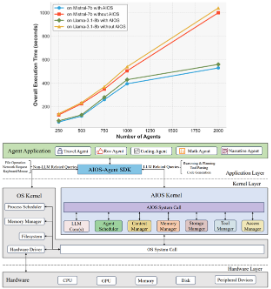

Performance enhancement for execution time with AIOS compared to Linux above, with AIOS architecture shown below
Invention Summary:
The integration and deployment of large language model (LLM)-based intelligent agents has been fraught with issues of sub-optimal scheduling and resource allocation of agent requests, difficulties in maintaining context during interactions between agents and the LLM, and the complexities inherent in integrating heterogeneous agents with different capabilities and specializations. The rapid increase of agent quantity and complexity further exacerbates these issues, often leading to bottlenecks and sub-optimal utilization of resources.
Rutgers researchers have created AIOS, an LLM agent operating system (AgentOS) that provides module isolation and aggregations of LLM and OS functionalities. To address the potential conflicts arising between tasks associated with LLM and those unrelated to LLM, they propose the design of an LLM-specific kernel. This kernel segregates the OS-like duties, particularly those related to the oversight of LLM agents, their corresponding resources, and development toolkits. Through this segregation, the LLM kernel aims to enhance the management and coordination of LLM-related activities. AIOS is designed to optimize resource allocation, facilitate context switch across agents, enable concurrent execution of agents, provide tool service for agents, and maintain access control for agents. Experiments running numerous agents simultaneously show the effectiveness and performance of the AIOS design and implementation, with nearly 2x reduction in latency for Mistral and Llama models when running thousands of agents. Using this system, one can not only improve the performance and efficiency of LLM agents but also build a crucial platform to facilitate the development, deployment, and usage of various complex agents. .
Market Applications:
Advantages:
Publications:
- K. Mei, X. Zhu, W. Xu, W. Hua, M. Jin, Z. Li, S. Xu, R. Ye, Y. Ge, and Y. Zhang, AIOS: LLM agent operating system (2025), arXiv:2403.16971 [cs.OS].
Intellectual Property & Development Status: Provisional application filed. Patent pending. Available for licensing and/or research collaboration. For any business development and other collaborative partnerships, contact: marketingbd@research.rutgers.edu